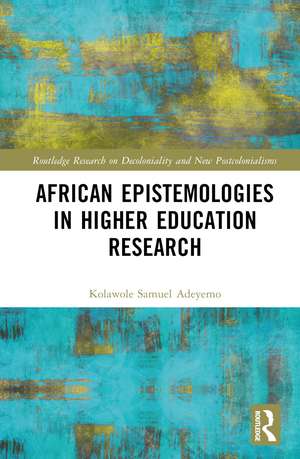African Epistemologies in Higher Education Research: Routledge Research on Decoloniality and New Postcolonialisms
Autor Kolawole Samuel Adeyemoen Limba Engleză Hardback – 13 sep 2023
This book uses an interdisciplinary approach to frame the connections between academic knowledge systems. Specifically, it seeks to answer questions on the trends in knowledge mobility, histories, and sociological dimensions in knowledge production in post-colonial Africa. The discussion explores how existing knowledge systems can better align with past and present narratives throughout African history and philosophies. The primary thought behind this book is to deconstruct the idea of a free market, the issue of corruption, racism and the neoliberalist approach to knowledge creation and transmission. Thus, it seeks to answer questions on the history and sociological dimensions of knowledge production in higher education.
The book argues that African epistemologies can be better understood by investigating present sociologies and histories shaping African higher education research. Researchers and university students in the field of sociology of education, economics of education, higher education and policy will find this book very useful.
| Toate formatele și edițiile | Preț | Express |
|---|---|---|
| Paperback (1) | 308.16 lei 3-5 săpt. | +10.83 lei 6-12 zile |
| Taylor & Francis Ltd (Sales) – 18 dec 2024 | 308.16 lei 3-5 săpt. | +10.83 lei 6-12 zile |
| Hardback (1) | 764.20 lei 6-8 săpt. | |
| Taylor & Francis – 13 sep 2023 | 764.20 lei 6-8 săpt. |
Din seria Routledge Research on Decoloniality and New Postcolonialisms
- 9%
 Preț: 935.37 lei
Preț: 935.37 lei -
 Preț: 341.52 lei
Preț: 341.52 lei -
 Preț: 279.41 lei
Preț: 279.41 lei -
 Preț: 325.92 lei
Preț: 325.92 lei - 17%
 Preț: 272.50 lei
Preț: 272.50 lei -
 Preț: 386.51 lei
Preț: 386.51 lei - 17%
 Preț: 259.98 lei
Preț: 259.98 lei -
 Preț: 383.68 lei
Preț: 383.68 lei -
 Preț: 387.75 lei
Preț: 387.75 lei -
 Preț: 379.09 lei
Preț: 379.09 lei -
 Preț: 389.66 lei
Preț: 389.66 lei - 17%
 Preț: 259.98 lei
Preț: 259.98 lei -
 Preț: 185.94 lei
Preț: 185.94 lei - 17%
 Preț: 272.50 lei
Preț: 272.50 lei -
 Preț: 389.66 lei
Preț: 389.66 lei -
 Preț: 381.47 lei
Preț: 381.47 lei - 18%
 Preț: 1002.63 lei
Preț: 1002.63 lei -
 Preț: 383.17 lei
Preț: 383.17 lei - 18%
 Preț: 1002.63 lei
Preț: 1002.63 lei - 18%
 Preț: 950.08 lei
Preț: 950.08 lei
Preț: 764.20 lei
Preț vechi: 1102.76 lei
-31% Nou
Puncte Express: 1146
Preț estimativ în valută:
146.27€ • 152.12$ • 122.57£
146.27€ • 152.12$ • 122.57£
Carte tipărită la comandă
Livrare economică 14-28 martie
Preluare comenzi: 021 569.72.76
Specificații
ISBN-13: 9781032428833
ISBN-10: 103242883X
Pagini: 92
Dimensiuni: 156 x 234 x 12 mm
Greutate: 0.45 kg
Ediția:1
Editura: Taylor & Francis
Colecția Routledge
Seria Routledge Research on Decoloniality and New Postcolonialisms
Locul publicării:Oxford, United Kingdom
ISBN-10: 103242883X
Pagini: 92
Dimensiuni: 156 x 234 x 12 mm
Greutate: 0.45 kg
Ediția:1
Editura: Taylor & Francis
Colecția Routledge
Seria Routledge Research on Decoloniality and New Postcolonialisms
Locul publicării:Oxford, United Kingdom
Public țintă
Postgraduate and UndergraduateCuprins
Introduction: An introduction to debates on African epistemologies
Chapter 1: Transforming knowledge from history
Chapter 2: Existentialist epistemology and the purpose of higher education
Chapter 3: Epistemology of pragmatism in postgraduate research
Chapter 4: Epistemic injustice in research publication
Chapter 5: Epistemology realism and racism in higher education
Chapter 6: Epistemological access to corruption in higher education
Chapter 1: Transforming knowledge from history
Chapter 2: Existentialist epistemology and the purpose of higher education
Chapter 3: Epistemology of pragmatism in postgraduate research
Chapter 4: Epistemic injustice in research publication
Chapter 5: Epistemology realism and racism in higher education
Chapter 6: Epistemological access to corruption in higher education
Notă biografică
Kolawole Samuel Adeyemo is a nationally rated scientist by the National Research Foundation (NRF) of South Africa. He is an Associate Professor in the Department of Education Management and Policy Studies at the University of Pretoria, South Africa. He holds a PhD in Educational Management from Cavite State University in the Philippines and did a postdoc at the University of Pretoria. He is a researcher in the field of international and comparative studies in higher education. His work often involves exploring new populations of internationally mobile students, issues of policy in emerging, and underresearched regional higher education destinations. He has worked as a visiting scholar at Indiana University Bloomington in the United States, Aarhus University in Denmark and visiting professor at the University of Victoria in Canada. He is the South Africa Country Director for the Society of Transnational Academic Researchers (STAR) and Assistant Editor for the Journal of International Students, a top-ten ranked academic journal in higher education. His recent book, Rhetoric of the Asia Higher Education Rankings (2023) analyzes the implications of the Quacquarelli Symonds (QS) world university rankings to gain insights into the usefulness of reputation rankings in addressing social inequality.
Descriere
Bringing a needed perspective on African Epistemologies on the critical topics of higher education in relation to knowledge systems, this book highlights how knowledge creation processes influence higher education systems, society, and African development.
